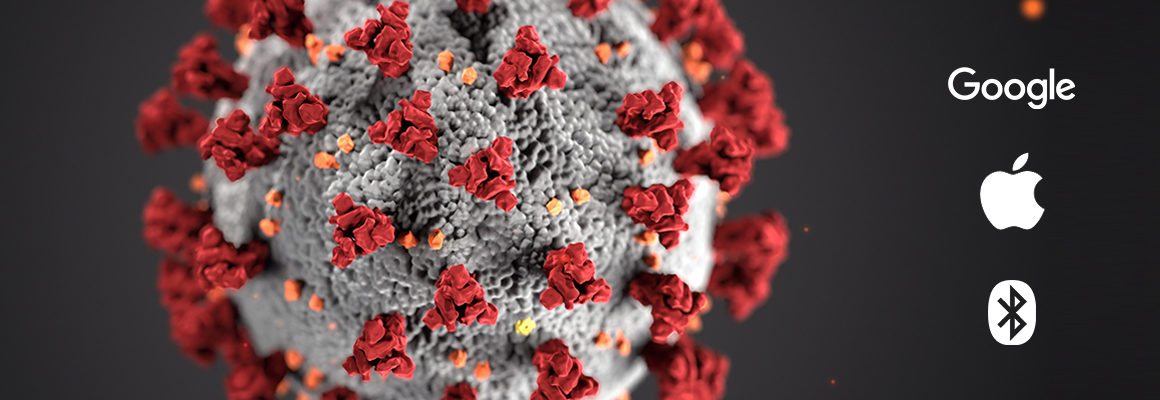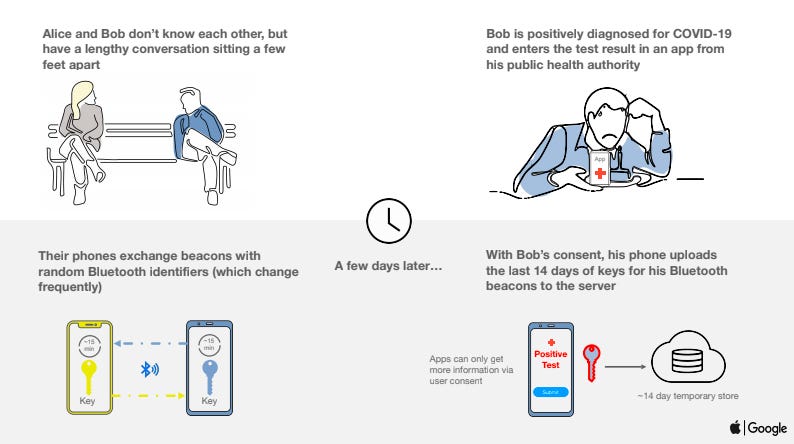Table of Contents
Apple and Google join forces against COVID-19
During last month we came across the news regarding one of the most famous collaborations in the history of modern technology. Yes, we are talking about the collaboration between Apple and Google which have embarked on this new venture in the times of the so known as “the fight against COVID-19”.
The two colossuses of the Silicon Valley have put their competition on hold for a while and seem to be concentrated in enabling a Bluetooth-based COVID-19 contact tracing mechanism.
As soon as the unprecedented update on the cooperation was communicated from both sides, the work started on building a platform that aims to turn nearly every smartphone into a COVID-19 tracking tool. Bluetooth will be used to detect other smartphones in close proximity and alert you of the if you come into contact with someone who tested positive for COVID-19. You won’t know their identity and they won’t know yours, but your phone will flash a notification letting you know you have been at risk of exposure.
The project execution
And now you must be wondering: How have they planned to execute the project?!
Later this month, Apple and Google will release APIs that allow contact tracing through third-party apps, released by public health authorities. The users of IOS and Android operating systems will be able to download the official apps through their respective app stores. And there is more to it. In the coming months, both companies plan on building an even broader contact tracing tool that will not require the download of a third-party app.
Their official communications have been almost the same citing:
“Across the world, governments and health authorities are working together to find solutions to the COVID-19 pandemic, to protect people and get society back up and running. Software developers are contributing by crafting technical tools to help combat the virus and save lives. In this spirit of collaboration, Google and Apple are announcing a joint effort to enable the use of Bluetooth technology to help governments and health agencies reduce the spread of the virus, with user privacy and security central to the design.”
Such a concept though is not quite new as we have previously discussed the respective measures taken by different governments throughout the world.
The first COVID-19 cases tracking apps were first seen in China and other Asian countries including Singapore, Taiwan and South Korea.
(We invite you to learn more about these efforts in our previous article.)
These tracking mechanisms on the other hand have been embraced by governments in US, UK and Europe as well.
The privacy management
In an attempt to save lives and help in this war against the health and economic crisis following the spread of COVID-19, these efforts seem to offer a solid solution. But, what does this mean for our privacy?! Will these apps be accurate?!
While the apps released by public health authorities in China and Israel consist in using the GPS or other location data from cellphones, this solution offered by Google and Apple seems to use only the Bluetooth. This system doesn’t collect any location data or any other data your phone may carry about you. The system will know that you have crossed paths with someone else at some point and unless you decide to share that information it will not leave your phone. Unless you decide to share, no one will know about your medical status.
Yet, contact tracing is ultimately a form of surveillance and it might go against the democratic principles.
On the other hand, the solution that these companies of major influence offer to mobilize the further spread of the pandemic, is useful in a lot of ways. For instance, the Singapore’s app TraceTogether works only when the iPhone is unlocked, something that Apple can adjust right away.
The companies have ensured the public that there will be no centralized server, therefore making malicious surveillance difficult. In addition, this service will be available to government public health agencies that are involved in coronavirus tracking. The service won’t be available to general public, companies, nongovernment organizations, or even academics making sure to avoid global privacy scandals.
For now, it seems like a promising project although the risks range from the technical to political factors. The implementation therefore will set the grounds for all the arousing suspicions. We will just wait and see what all this will mean.






